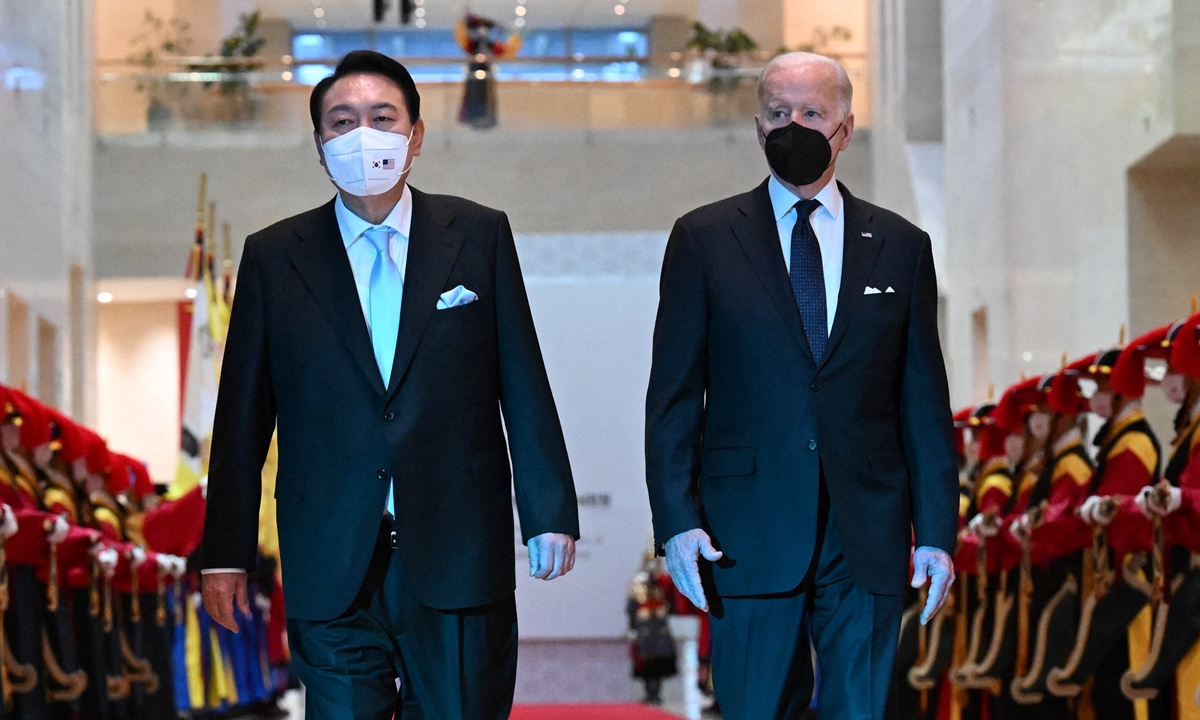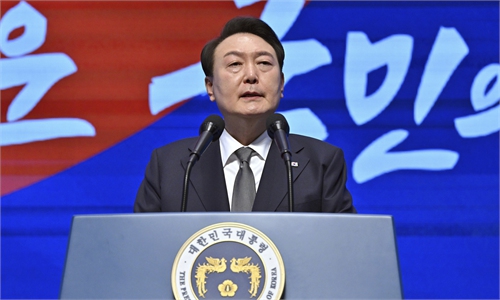
South Korean President Yoon Suk-yeol (centre left) and US President Joe Biden arrive for a state dinner in Seoul on May 21, 2022.Photo: AFP
South Korean President Yoon Suk-yeol is reportedly set to make a state visit to the US from April 24 to 30 aiming to bolster the two countries' alliance.
However, domestic dissatisfaction over the government's "humiliating diplomacy" with the US is mounting, with many analysts warning that relations with neighboring countries, especially China, should not be sacrificed as a token of allegiance to flatter the US.
Yoon and US President Joe Biden are scheduled to hold a summit and joint news conference on April 26, and the South Korean president will deliver a speech to the US Congress on April 27. Yoon's visit, which will be a first to the US made by a South Korean leader since 2011, will mark the 70th anniversary of the US-South Korea alliance, Yonhap news agency reported.
Although both South Korea and the US are attempting to further promote their alliance, they have different focuses - the Yoon administration aims to use the alliance as a springboard to make South Korea a global pivot, while the US, by pulling together a small clique with South Korea and others of its allies, seeks to contain China in the fields of security and economy, Wang Junsheng, a research fellow of East Asian studies at the Chinese Academy of Social Sciences in Beijing, told the Global Times on Thursday.
South Korea is in the subordinate position in its alliance with the US, and the inequality in their relations has been fully exposed through some recent events, which means South Korea will humbly seek to strengthen the alliance, analysts said.
The South Korean government has been facing growing dissatisfaction and criticism for its evasive response to leaked US intelligence documents that purportedly contain private conversations between senior South Korean officials on Ukraine, suggesting Washington has been spying on South Korea.
Yoon's approval rating has also fallen below 30 percent for the first time in five months, and diplomacy was the most-mentioned factor in the assessment of his performance, Yonhap news agency reported on April 14.
Yoon has also come under massive criticism over his foreign policy toward Japan, another US ally in Asia, especially on the government's plan to compensate South Korean victims of Japan's forced labor during WWII through a fund run by a public foundation without the direct involvement of the Japanese firms responsible.
Yoon's trip to the US may not yield a pragmatic outcome due to the unequal alliance. Biden's "efforts" to value relations with South Korea remain superficial. More pressure will be exerted on South Korea to cooperate with the US on containing China and deterring North Korea, which will not address South Korea's concerns on security but instead aggravate the situation on the Korean Peninsula, said Wang.
During their summit, Yoon and Biden are anticipated to discuss joint responses to deter North Korea, and they are also likely to "consult on how to support Ukraine, amid mounting Western pressure for South Korea to help it battle Russian forces", Reuters reported.
The South Korean government's diplomatic tilt toward the US has brought no good and only mounting criticism. the US, an ally of South Korea, is also prepared to sacrifice South Korea at any time for its own interests and will not hesitate to stab South Korea in the back when it needs to. The latest example is the two countries' dispute over US subsidies for electric vehicles, Lü Chao, an expert on the Korean Peninsula issues at the Liaoning Academy of Social Sciences, told the Global Times on Thursday.
South Korea's relations with neighboring countries, especially China, should not be used as a token of allegiance to trade for closer relations with the US. The eroding of diplomatic independence will harm South Korea's international image and may compromise for more as the result of such humiliating form of diplomacy, said Lü.



